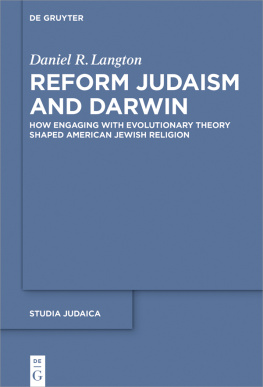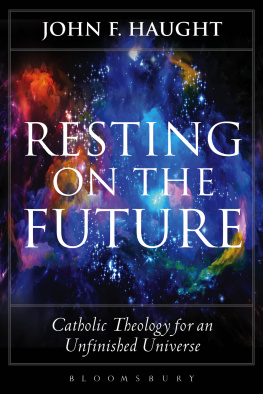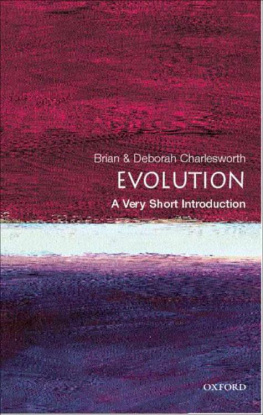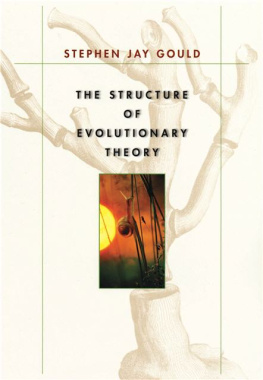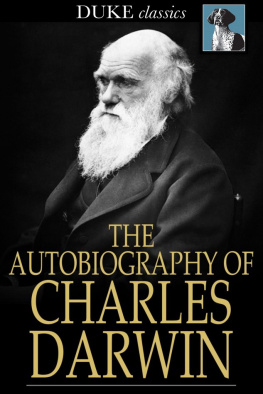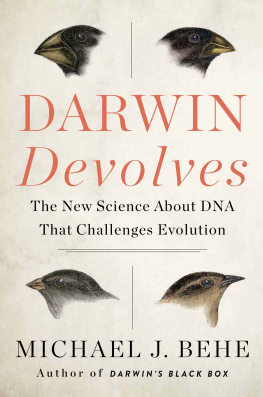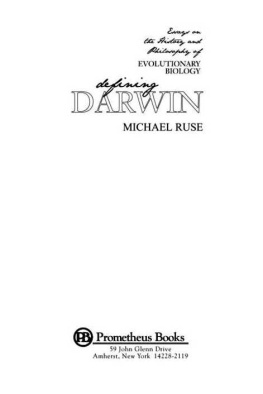First Published 2003 by Westview Press
Hardcover edition first published in 2003 by Westview Press,
Paperback edition first published in 2004 by Westview Press.
Published 2018 by Routledge
711 Third Avenue, New York, NY 10017, USA
2 Park Square, Milton Park, Abingdon, Oxon OX14 4RN
Routledge is an imprint of the Taylor & Francis Group, an informa business
Copyright 2003 Taylor & Francis
All rights reserved. No part of this book may be reprinted or reproduced or utilised in any form or by any electronic, mechanical, or other means, now known or hereafter invented, including photocopying and recording, or in any information storage or retrieval system, without permission in writing from the publishers.
Notice:
Product or corporate names may be trademarks or registered trademarks, and are used only for identification and explanation without intent to infringe.
The Library of Congress has catalogued the hardcover edition as follows:
Haught, John F.
Deeper Than Darwin: the prospect for religion in the age of evolution / John F. Haught.
p. cm.
Includes bibliographical references and index.
ISBN 0-8133-6590-2 (he)
1. EvolutionReligious aspectsChristianity. I. Title.
BT712.H377 2003
231.7652dc21
2002153464
ISBN 13: 978-0-8133-4199-6 (pbk)
Just how deep can evolutionary biology take us in the ageless human endeavor to understand life and its various manifestations? This is a question of great general significance today, but it is one of special interest to those who wonder if there is still room in an age of science for an illuminating religious or theological understanding of life. The present work addresses this issue.
This books reflections on Darwin and religion are a sequel to those first presented in God After Darwin: A Theology of Evolution (Westview Press, 2000). The earlier book assumed the general accuracy, as well as the theological fertility, of Darwinian accounts of life, but it did not focus as extensively on the question of Darwinisms explanatory adequacy as does the present one.
Several chapters and subsections of the book are adaptations of recent articles that I have published elsewhere. is adapted from Theology After Contact: Religion and Extraterrestrial Intelligent Life, Annals of the New York Academy of Sciences, Vol. 950 (December 2001).
I would like to express my gratitude to Westview Press senior editor Sarah Warner and senior project editor Rebecca S. Marks for shepherding this project to completion. And my deepest appreciation goes to my wife, Evelyn, not only for her unending support of my work but also for reading and criticizing the manuscript.
In his strange new story of life, Charles Darwin exposed a depth in the natural world that we had never before fathomed. After Darwin, evolutionary science has continued to uncover extended pathways of lifes struggle paved with pain, waste and death. It has also revealed a vast domain of creativity, but for many people today this is not enough to redeem so heartless a process. Evolution still often sounds like bad news, not only to religious believers but even to some biologists, paleontologists and philosophers troubled by the wickedness of natural selection. No matter how one interprets it, though, evolutionary discovery has taken us deep into nature, perhaps deeper than science had ever ventured before. Have we perhaps, through Darwinian eyes, stared into the very bottom of natures well? Or may we look down even deeper?
The point of this book is to dig deeper than Darwin. I will assume here the fundamental correctness of evolutionary biology, but I want to question the nonscientific belief that evolutionary biologyor for that matter the cumulative body of natural sciencesamounts to an adequate explanation of living phenomena. Even though Darwinism is illuminating, it by no means tells us everything we need to know about life, even in principle. It certainly does not alone provide the space within which people, including the most devout Darwinians, can live their lives. Although evolutionary biology gives an enlightening account of some aspects of life, like all sciences it leaves out a lot. And although Darwinian concepts can even shed light on human existence, their explanatory power is easily exaggerated. To find the deepest, though certainly not the clearest, understandings of life and the universe, we may still profitably consult the religions of the world.
Religions, of course, are not uniformly pretty. Their lofty ideals, as Alfred North Whitehead observed, mingle with the crudest forms of barbarism. Sometimes their scriptures are stylistically primitive and their moral teachings obtuse. And yet, as Whitehead goes on to say, religion is our one ground for optimism. Although certain traits of religion may embarrass us at times, it is hardeven in an age of scienceto ignore completely its persistent intuition that the universe, beneath it all, makes sense. It is not easy for most people simply to shove aside the religious sense that, in spite of all evil, there is reason to hope for final deliverance. Unless there is some substance to the various creeds, mutually incompatible though they may often seem to be, our own lot is a sad one, and the end of all life, struggle and achievement is nothingness.
The question today, however, is whether we can embrace religious hope in an intellectually honest way. Numerous educated people are now convinced that science, especially evolutionary biology, has made religion implausible and obsolete. Some even see science as completely irreconcilable with religion. Others view religion as emotionally and morally tolerable, but intellectually superfluous after the rise of science. Many sincere people now believe that only science can understand fully what is going on in the universe. For them, reality consists fundamentally of material elements and physical processes. Even though contemporary physics has demonstrated that matter is much more subtle and slippery than previous generations had supposed, a lot of scientists and philosophers still embrace the conviction that, at bottom, matter or matter-plus-energy is really all there is.
In no sector of contemporary scientific culture is this materialistnow sometimes called physicalistview so strikingly prominent as among evolutionists. We shall be surveying ample evidence of this fact in the following pages, but I would like to note even here what a remarkable reversal in the history of ideas it is that biology has now become such a stronghold of materialism. Michael Ruse, one of the most authoritative voices in the philosophy of evolution, declared recently that Darwinism is the apotheosis of a materialistic theory. Yet, at the beginning of the modern age, it was not biology but physics that reduced the universe to purely material stuff. So exceptional did life seem in comparison with inanimate nature that it required an extraphysical explanation. Even many hard-core scientists used to think that a supernatural agency was essential to lift dead matter up to the level of life. However, this so-called vitalist perspective has nearly vanished, at least as far as scientists are concerned, and the temper of evolutionary thought today is predominantly materialist.
Some readers may bristle at my usage of terms like materialist and materialism to characterize the still prevalent philosophy of nature assumed by evolutionary thought today. Nevertheless, I shall generally employ these terms rather than physicalist and physicalism, especially since so many prominent evolutionists have no difficulty referring to their own thought as materialist. Ever since Einstein, of course, the term matter has really meant matter-energy, a subtler notion, and so some philosophers now prefer the term physicalism to earmark the belief that matter-energy, rather than just matter, is the ultimately real stuff in the universe. As we shall see, however, the term materialism will still do quite nicely. Numerous biologists, and evolutionists in particular, are quite comfortable with this designation.


